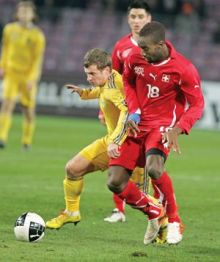The match with Switzerland’s national team in Geneva has finished the Ukrainian team’s current year. The year turned out to be full of contradictions, as seen in the last game. On November 17, though, the football community’s attention was focused not only on the football match itself. This day was marked with the symbolical handing of the relay baton from Switzerland, which organized Europe Championship together with Austria two years ago, to Ukraine, which is to hold this tournament in 2012.
The analogies end at this point, stated FFU president Hryhorii Surkis at a press conference in Geneva. The Alpine country for a long time had, and continues to develop, its transport (and other kinds of) infrastructure on the level that allows them to conduct an international event of any kind even tomorrow. In Ukraine, these things practically have to be started from scratch. And it depends only on us if we take the opportunity of conducting Euro-2012 so that our roads, hotels, railroad stations and airports would at least come closer to Swiss standards.
I have seen it with my own eyes — the highway network and traffic intersection around Geneva impressed me already in 1997. Since then only two things have changed: a new beautiful stadium was built and the borders with France, which surrounds the Swiss city from three sides, were opened.
Nowadays Geneva is not a football city: the local team Servette does not please its few fans with outstanding results. But the average level of Swiss football is steadily getting better, as evidenced by the Swiss national team’s position in global rankings — it takes a much higher place than Ukraine.
Before the match with the Swiss, everyone recalled the two teams meeting at the World Cup in Germany in 2006. That game was nervous and uninteresting, but we didn’t care about that. Indeed, after a 0:0 draw our team has won in penalties and got to the quarterfinals. Somehow the teams’ new meeting, even in a friendly status, will resemble a four-year old duel.
Anatolii Tymoshchuk was the only player to remain from the first team of that time, proving that trainers are unceasingly searching for new players. Yet the search is not as effective as one would hope. The team of Switzerland, under the direction of a German trainer Ottmar Hitzfeld, is not inclined to experiment and is more stable. Most importantly, it has recognized leaders in each part of the team. Alexander Frei is, of course, beyond comparison — he is as famous in Switzerland as Andrii Shevchenko is in Ukraine.
Despite the promises to show serious football, the Ukrainian team did not appear convincing during the better part of the game. The attack practically couldn’t do anything, and defense created problems for itself. Maybe the reason lies in the status of the match, due to which the referee did everything possible to secure the players from injuries. The smallest contact between the footballers led to a penalty. With the help of these penalties the hosts, who had a more confident control of the ball, created dangerous situations near Andrii Piatov’s gates. He twice saved the team after a dangerous play. But he failed the third time — Frei’s penalty kick was perfect.
The Swiss captain distinguished himself after the penalty for the second time — he was the first to be in time for a pass, missed by our central defenders. Ukrainians managed to avoid a defeat due to the ricochet after another unsuccessful penalty by Oleksandr Aliiev. The ball hit Andrii Yarmolenko’s back and rebounded to the Swiss gate. The second goal was the result of a masterful hit by Yevhen Konoplianka, who looked not worse than Frei.
Generally speaking, the Ukrainians lost the center of the field, which was run by Djourou and Yakin, who didn’t notice that Aliiev and Tymoshchuk were aiming to play the same role. Why did this happen? As for me, I believe the reason is that practically all players of the team, which competed in Switzerland, got used not to play, but to play on the level of their partners. A few combinations between Aliiev and Milevsky in the second period were rather a memory of common playing in the years of youth than an organized cooperation in the present team. Neither Devych, nor Yaromolenko and Konoplianka showed their potential. The potential of others is difficult to speak about. As they say, the coaches know better.
In general, the Ukrainian team started the year with experiments in May, and finished it with experiments in November. Hope remains that we shall see the contours of a real battle-worthy team with a stable pool of players and adjusted technique next year.







